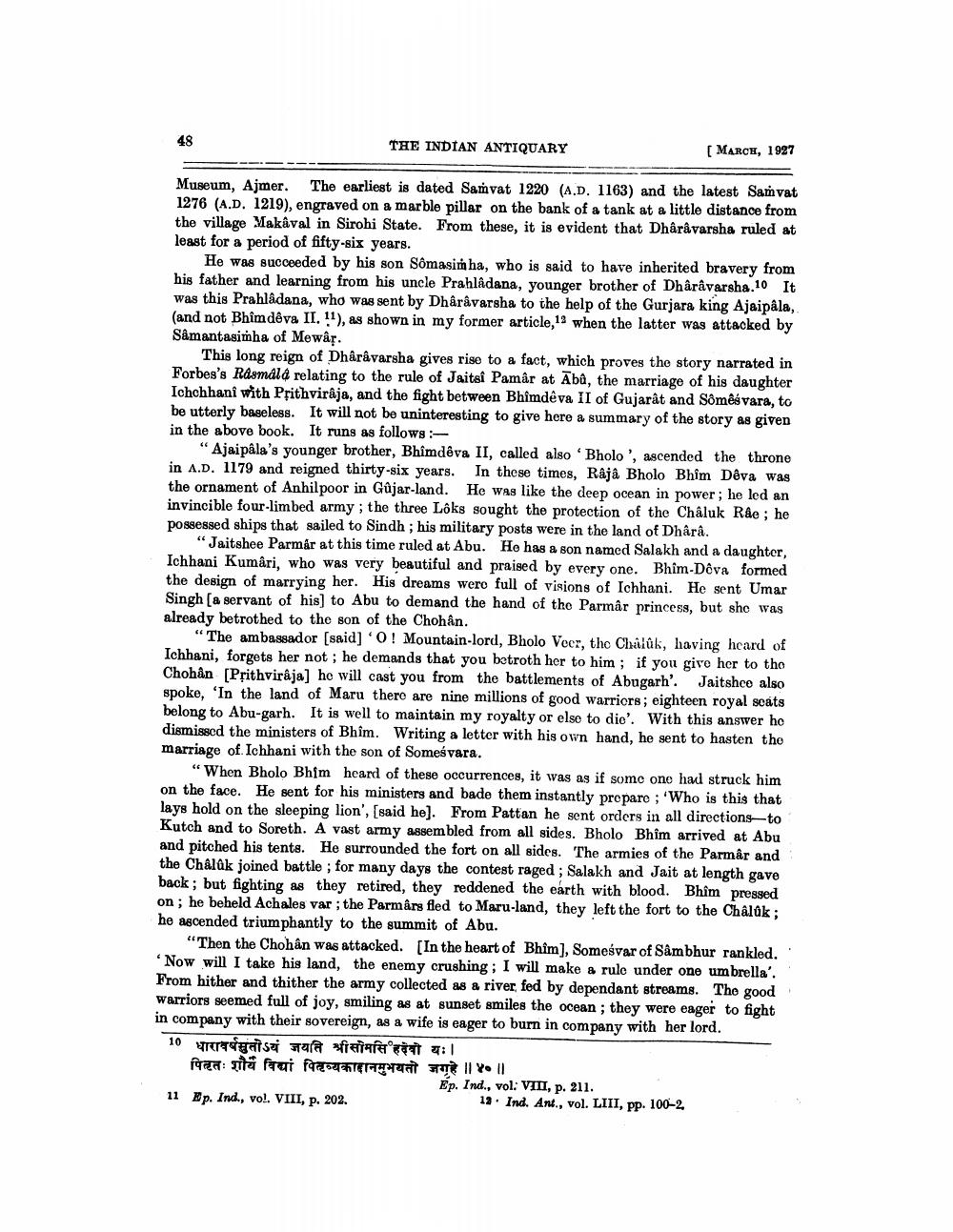________________
48
THE INDIAN ANTIQUARY
Museum, Ajmer. The earliest is dated Samvat 1220 (A.D. 1163) and the latest Samvat 1276 (A.D. 1219), engraved on a marble pillar on the bank of a tank at a little distance from the village Makâval in Sirohi State. From these, it is evident that Dhârâvarsha ruled at least for a period of fifty-six years.
He was succeeded by his son Sômasimha, who is said to have inherited bravery from his father and learning from his uncle Prahlâdana, younger brother of Dhârâvarsha.10 It was this Prahladana, who was sent by Dhârâvarsha to the help of the Gurjara king Ajaipâla, (and not Bhîm dêva II. 11), as shown in my former article, 13 when the latter was attacked by Sâmantasimha of Mewâr.
This long reign of Dhârâvarsha gives rise to a fact, which proves the story narrated in Forbes's Rasmal relating to the rule of Jaitsi Pamâr at Abû, the marriage of his daughter Ichchhani with Prithvirâja, and the fight between Bhîmdêva II of Gujarât and Sômêsvara, to be utterly baseless. It will not be uninteresting to give here a summary of the story as given in the above book. It runs as follows:
[ MARCH, 1927
"Ajaipâla's younger brother, Bhîmdêva II, called also 'Bholo', ascended the throne in A.D. 1179 and reigned thirty-six years. In these times, Râjâ Bholo Bhim Dêva was the ornament of Anhilpoor in Gûjar-land. He was like the deep ocean in power; he led an invincible four-limbed army; the three Lôks sought the protection of the Châluk Râe; he possessed ships that sailed to Sindh ; his military posts were in the land of Dhârâ.
"Jaitshee Parmár at this time ruled at Abu. He has a son named Salakh and a daughter, Ichhani Kumari, who was very beautiful and praised by every one. Bhim-Dôva formed the design of marrying her. His dreams were full of visions of Ichhani. He sent Umar Singh [a servant of his] to Abu to demand the hand of the Parmâr princess, but she was already betrothed to the son of the Chohân.
"The ambassador [said] O! Mountain-lord, Bholo Veer, the Châlûk, having heard of Ichhani, forgets her not; he demands that you betroth her to him; if you give her to the Chohân [Prithvirâja] he will cast you from the battlements of Abugarh'. Jaitshee also spoke, 'In the land of Maru there are nine millions of good warriors; eighteen royal seats belong to Abu-garh. It is well to maintain my royalty or else to die'. With this answer he dismissed the ministers of Bhim. Writing a letter with his own hand, he sent to hasten the marriage of. Ichhani with the son of Someśvara.
11 Ep. Ind., vol. VIII, p. 202.
"When Bholo Bhim heard of these occurrences, it was as if some one had struck him on the face. He sent for his ministers and bade them instantly prepare; 'Who is this that lays hold on the sleeping lion', [said he]. From Pattan he sent orders in all directions-to Kutch and to Soreth. A vast army assembled from all sides. Bholo Bhim arrived at Abu and pitched his tents. He surrounded the fort on all sides. The armies of the Parmar and the Châlûk joined battle; for many days the contest raged; Salakh and Jait at length gave back; but fighting as they retired, they reddened the earth with blood. Bhîm pressed on; he beheld Achales var; the Parmârs fled to Maru-land, they left the fort to the Châlûk; he ascended triumphantly to the summit of Abu.
"Then the Chohân was attacked. [In the heart of Bhim], Someśvar of Sâmbhur rankled. 'Now will I take his land, the enemy crushing; I will make a rule under one umbrella'. From hither and thither the army collected as a river, fed by dependant streams. The good warriors seemed full of joy, smiling as at sunset smiles the ocean; they were eager to fight in company with their sovereign, as a wife is eager to burn in company with her lord. 10 धारावर्षसुतोऽयं जयति श्रीसोमसि हदेवो यः ।
hi frat fwngeant w
|| + ||
Ep. Ind., vol: VIII, p. 211.
13 Ind. Ant., vol. LIII, pp. 100-2,




